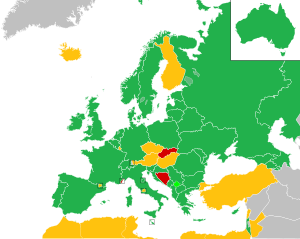
Back Κατάλογος χωρών της Παιδικής Eurovision Greek Anexo:Participación en el Festival de la Canción de Eurovisión Junior Spanish Մանկական Եվրատեսիլ երգի մրցույթին մասնակցող երկրների ցանկ Armenian Nazioni partecipanti al Junior Eurovision Song Contest Italian Список на учесници на Детскиот избор за песна на Евровизија Macedonian Land i Junior Eurovision Song Contest NN Konkurs Piosenki Eurowizji dla Dzieci#Uczestnicy Polish Страны на «Детском Евровидении» Russian Spisak država učesnica na Dečjoj pesmi Evrovizije Serbian Lista över länder som deltagit i Junior Eurovision Song Contest Swedish



Broadcasters from forty-one countries have participated in the Junior Eurovision Song Contest since it started in 2003, with winning songs coming from twelve of those countries. The contest, organised by the European Broadcasting Union (EBU), is held annually between members of the union who participate representing their countries. Broadcasters submit songs to the event where they are performed live by the performer(s) aged 9 to 14 they had selected, and cast votes to determine the winning song of the competition.
Participation in the contest is primarily open to all broadcasters with active EBU membership, with only one entrant per country allowed in any given year. To become an active member of the EBU, a broadcaster has to be from a country which is covered by the European Broadcasting Area –that is not limited only to the continent of Europe–, or is a member state of the Council of Europe.[1] Thus, eligibility is not determined by geographic inclusion within Europe, despite the "Euro" in "Eurovision", nor does it have a direct connection with the European Union. Several countries geographically outside the boundaries of Europe have been represented in the contest: Cyprus, Armenia, and Israel, in Western Asia, since 2003, 2007, and 2012 respectively; and Australia making a début in the 2015 contest. In addition, several transcontinental countries with only part of their territory in Europe have been represented: Russia, since 2005; Georgia, since 2007; Azerbaijan, since 2012; and Kazakhstan, which made its first appearance in the 2018 edition. Australia, where the contest has been broadcast since 2003, débuted as a participant in the 2015 edition, as its broadcaster is an EBU associate member and had received special approval from the contest's Reference Group.
The Netherlands is the only country to have entered the contest each year since 2003, while Switzerland have only entered on one occasion, in 2004. Broadcasters from three countries – Slovakia, Monaco, and Bosnia and Herzegovina – have announced their intention to enter the contest before withdrawing prior to the country's début.
Cite error: There are <ref group=lower-alpha> tags or {{efn}} templates on this page, but the references will not show without a {{reflist|group=lower-alpha}} template or {{notelist}} template (see the help page).
- ^ "Admission". EBU. European Broadcasting Union. Retrieved 12 April 2017.